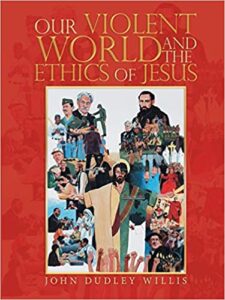John Dudley Willis
Education
![]() Ph.D. The University of Chicago
Ph.D. The University of Chicago
M.A. The University of Chicago
M.Div. Emmanuel School of Religion
B.A. Kentucky Christian University
Certifications
The Conflict Dynamics Profile®
The Meyers-Briggs Type Indicator
Thomas-Kilmann Conflict Mode Instrument
Commonwealth of Kentucky, KY Commission on Human Rights (EEO Enforcement)
United States Postal Service (REDRESS Mediation)
The International Center for Dispute Resolution (Mediation)
National Ethics Leadership
(by invitation only – professional standards of practices, grievances – past)
American Bar Association, Section of Dispute Resolution, Ethics Committee
Association for Conflict Resolution, Ethics Committee
International Ombuds Association, Ethics Committee
National Association for Community Mediation, Ethics Committee
Association of Family and Conciliation Courts, Ethics Committee
Leadership Highlights
Conflict Management Education – Graduate Degree Design/Administration
Designed and administrated first 100% online U.S. Master of Science in Dispute Resolution based on national standards of practice, with required industry practicum (Sullivan University, Louisville, KY)
Conflict Resolution Practice – Governmental EEO Enforcement
Mastered the enforcement of U.S. Civil Rights Laws, demonstrated by a 63% (gross case load) Conciliation Settlement agency record; performed peer investigator case reviews and consultations; applied expertise to agency Intake and Procedures Form, leading to increased case process/investigation efficiency (Kentucky Commission on Human Rights, Louisville, KY)
Conflict Management Education – Mediators and Arbitrators – (1)”Advancing Graduate Education in the Study of Dispute Resolution,” Federal Alternative Dispute Resolution Managers Luncheon (nationally teleconferenced), the U.S. Department of Energy, Washington DC; (2) “Enculturation, Trauma, and Neutrality: Adverse Impact of Experiences on Professional Process and Judgment” 17th Annual Conference, Center for Alternative Dispute Resolution, Greenbelt, MD
Conflict Management Education – Government Leaders – (1) “Transforming Municipal Efficiency Through Conflict Resolution,” The International Institute of Municipal Clerks, Annual Convention, New Orleans, Louisiana; (2) “Ethical Principles for Government Leadership for Municipal Clerks,” The Annual Meeting of the Kentucky Municipal Clerks, Louisville, Kentucky; (3) “Managing Conflict in the Municipal Workplace,” 92nd Annual Conference, Illinois Municipal League, Chicago, Illinois; (4) “Ethical Representations and Customer Satisfaction,” The Kentucky Tourism Council, Frankfort, Kentucky
Conflict Management Education – Religious Communities – (1) “EEO Grievances and Litigation in Ecclesial Communities: Bishops Session,” The Kentucky Council of Churches, Annual Assembly, Bardstown, KY; (2) “Restorative Recognition–Victimization Through the Theology of Abuse,” Clergy Restorative Justice Working Group, Chicago, Illinois; (3) “Racism in the U.S. and Commonwealth of Kentucky: Choosing a New Christ-Centered Path,” Program Unit for Peacemaking and Racism, Kentucky Council of Churches, Lexington, Kentucky
Conflict Management Education – Religious Violence – (1) “Ten Years After September 11, 2001–Reflections in Three Parts for the Presbyterian Church USA”; (2) “A Thousand Year Dynamic: Continuing Impacts of the Crusades on Current International Relations,” Frazier Historical Museum, Louisville, KY; (3) “Moses, Jesus, Muhammad: What Did the Prophets Teach Concerning Religious Violence/War?,” Association for Conflict Resolution Annual Meeting, Sponsored by the Section on Spirituality, Sacramento, CA; (4) “The Traditio Dissensionis: Foundations for Religious Hatred in Scripture and Exegetical Tradition,” Loyola Marymount University, Los Angeles, California, Casassa Conference [published by the University of Scranton Press]
Ethics Education in Ministry
-
6/98 Panelist, “A Religious Response to Child Abuse and Neglect” [clergy as mandated reporters, corporal punishment, and cooperative efforts between religious, legal, and social service professionals] The Broome County Child Abuse Council, Binghamton, NY
-
6/98 Lectures, “Evangelicalism and Protestant Liberalism,” Seminar, The Old Well Christian Church, Spencer, Virginia
-
2/98 Convener, “Sex, Lies, and The Truth”–A Teen Forum, and Workshop On Sex, AIDS, Death and God’s Grace! [community awareness for pregnancy prevention, AIDS transmission]
-
02/96 Lecture, “Children Need Saving–Caveat Emptor!” [parents’ duties to their children, and the children of others], Seminar on Preserving Inner City Youth: “SAVE OUR CHILDREN!”, Suitland Christian Church, Suitland, MD
-
05/95 Lecture, “The Sources of Spiritual Power” [spiritual renewal for men] The Capital Area Men’s Fellowship, Washington, DC
-
03/93 Lecture, “The traditio dissensionis: Foundations for Religious Hatred in Scripture and Exegetical Tradition,” The Casassa Conference, Loyola Marymount University, Los Angeles, California
-
04/92 Lecture Series, “Keeping Love Alive–Couples Getting It Back Together,” 8-week Marriage Enrichment Seminar, Rockville, Maryland
-
11/90 Lecture, “The Miracles of Scripture: Newman and English Rationalism,” The Interdisciplinary Newman Centenary Conference, St. Louis University, St. Louis, Missouri
-
03/90 Lecture, “A Case Study in Early Jesuit Scholarship: Alfonso Salmerón and the Study of Sacred Scripture,” The Casassa Conference, Loyola Marymount University, Los Angeles, CA
-
04/88 Lecture, “Who Is a Christian?,” The Jewish-Christian Dialogue [sponsored by the American Jewish Committee, The Archdiocese of St. Louis, The National Conference of Christians and Jews–requested participation by Archdiocese of St. Louis Ecumenical Officer]
Book
Our Violent World and the Ethics of Jesus
Available on Amazon and Barnes and Noble
The results of forty years of academic research, the book demonstrates in four Parts the following heavily documented themes, each with footnotes containing deeper critical discussions, and original texts in Greek, Latin, German, and French, for the benefit of readers knowing those languages:
Part 1: Examples of Christian Violence in the Past
Part 2: Violence-Related Words and Deeds of Jesus of Nazareth in the Bible
Part 3: What Happened to Jesus’ Violence-Related Doctrines After He Was Gone?
Part 4: Violent Christians, World War 3, and the Apocalypse
Willis loves Jesus Christ for his teachings and example on how people should love God, themselves, their kin, their neighbors, and even their enemies. However, having studied 1700 years of Christians in various nations and positions of authority engaging in every form of violence, Willis decided in 2015 it was time to write a book. With his PhD from the University of Chicago in historical theology, and having centered on Christian violence in the 16th century wars of religion, he set out to separate, once and for all, the Jesus of the Bible from the salvation doctrines of the vast majority of the Christian Churches in the world.
This book definitively shows the chasm between Jesus’ commands–and what he clearly thought about obedience and disobedience to them–and the salvation doctrines taught by nearly all the Christian Churches in the world. The latter Churches’ salvation systems, which they make the Master over Jesus’ clear and simpler words, are responsible for the entire history of 1700 years of Christian violence, in all its forms. If, as Willis estimates at the beginning of this book, Half a Billion people (500,000,000) have died at the hands of “orthodox” Christians, and since Christians with nuclear weapons will slay millions more when World War 3 occurs, based on Jesus Christ’s words, he will reject and condemn “orthodox” Christians on the Day of Judgment.
Thus, this book is a book of heresy for nearly all the Christians in the world, except for those who love Jesus Christ and his commands more than the authority of any contradicting Christian after him; from the Apostle Paul, to any Pope, to Martin Luther, to Billy Graham, to any megachurch leader today, all who will not be the Final Judge of the living and the dead.
The original draft for this text was over 600 pages, now cut to 300. The text is formal and clear but dense, written for readers both intelligent and patient, who are willing to work through the difficult materials. Willis refused to use scholarly jargon, since he was not writing to a circle of scholars, yet he freely uses his own scholarly voice in the footnotes. In those he is both intellectual and yet unusually candid in discussions of texts, personal viewpoints, and the harshest condemnations for some famous people, such as the famous war strategist, Carl von Clausewitz (1780-1831). Willis shreds Clausewitz’s famous dictum, “War is politics by other means” (Der Krieg is eine blosse Fortsetzung der Politik mit anderen Mitteln), with the realities of war’s gore, chaos, hell, and insanity on the ground. Politicians lie to their citizens about the “nobility of war,” yet do not send their children or grandchildren into what they truly know is an abattoir, a slaughterhouse.
Willis sent the book out into the public with flaws he already knew were there. He was consumed by caring for his father suffering dementia and decline. He did not have enough funds to hire a critical editor with multilingual capacities. He feared that the good content he knew he had might never see the light of day, if he died by accident. So he swallowed his considerable pride in scholarly precision, and allowed what he had done to be given a Library of Congress Control Number (2019917330), and three International Standard Book Numbers for the hardback, paperback, and electronic versions. Perhaps, if some publisher or patron helps, Willis will rework this book into a final comprehensive reference work.

